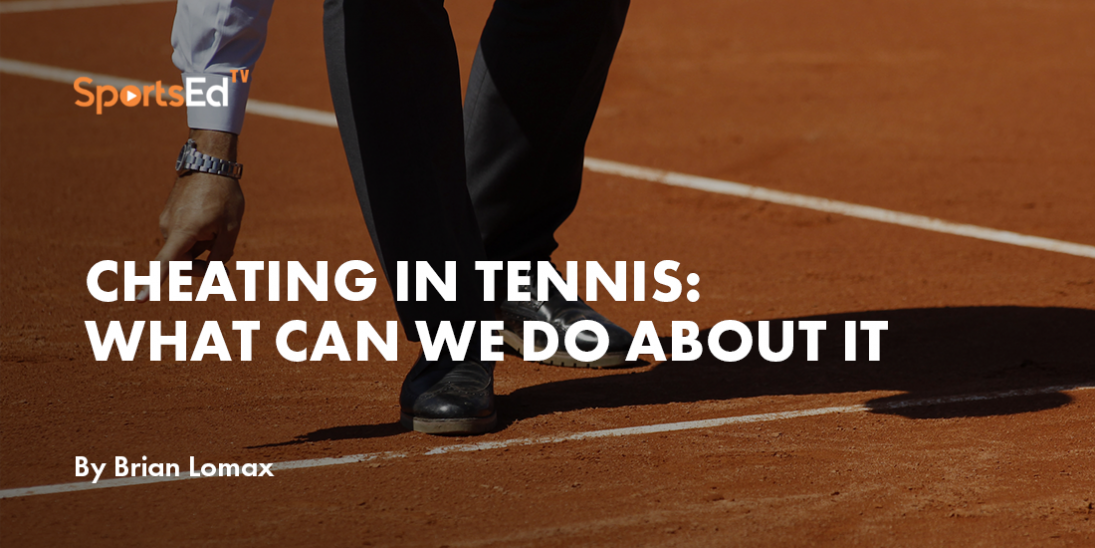Tennis
Welcome and thanks for visiting...

Cheating in Tennis: What Can We Do About It

Cheating in a tennis match is not new. Nor is unethical behavior. Both have been in the spotlight recently, especially in college tennis. We might blame the streaming of the match today, as the digital world has stressed the norms in much of life’s activities.
The shame of tennis players acting in a tennis match today this way has been lamented by Jon Wertheim of Tennis Channel in his Sports Illustrated article and mirrored in a Twitter thread following an ugly moment captured on video by a Top 10 Division I University tennis player.
Behavior like this isn’t just a collegiate tennis problem. It has been a forever issue, having a blooming season of late, sucking the spirit of sports out of competition in tennis. Cheating and its first cousin, unethical actions to gain a distraction advantage, have been in the quiver of poor sports before balls bounced. It happens at all levels, sadly at junior tennis tournaments, emulating the adult competitions.
Cheating and unethical behavior is a nose-thumbing taunt to the traditions and principles of competition. Why do it? What can we do about it?
Tennis Competitors Are Intense
Attempts to explain by saying competition is driven by tennis players doing whatever it takes to win is only a half-truth. The real truth lies in the knowledge that tennis players who cheat are NOT competitive—they just like to win. Do not make the mistake of conflating the two. Winning and being competitive are not the same.
What It Means to Be a Competitive Tennis Player
Let's take a look at three components of being a competitive tennis player. They're presented below in order of importance:
- Wanting to compete and enjoy the process of competing
- Viewing competition as a means of improving and mastering the sport
- Having a strong desire to win
Note that wanting to win, though a critical element, IS third in order of importance. True competitors embrace the challenges of competition, and true champions embrace them with courage, dealing with adversity while doing what is right by honorable standards. Progress is fed by how challenges and obstacles are met.
T
he Cheater in a Tennis Match
Cheating is a cowardly act. Compromising personal character to win a tennis match is cowardly. Cheaters are unlikely champions because playing without fairness, integrity, and respect is the hallmark of failure. Though sad, cheaters do exist.
As a caveat, I must add it is truly unfortunate that some tennis players, especially juniors, find themselves in a cheating dilemma. Pressure from tennis coaches, even tennis parents can be daunting, even fueling poor on-court behavior instead of a brutal after-match ride home or other unpleasantries losing might incite.
Who Do You Trust in The Court?
Imagine this: Your team match is tied, 3-all. Your team's last player—a cheater—is in the deciding the tennis match. Do you trust him or her to come through? I wouldn't. I can’t consistently trust a tennis player who takes shortcuts all the time to succeed under pressure. They don’t have the true competitive character to do it, relying on taking the easy way out.
Can Better Officiating Solve the Problem of Cheating in a Tennis Match Today?
Some suggest that tennis governing bodies and officials should do more to enforce the rules and integrity of the tennis game. That might be an answer, but it's not the answer to cheating. Better officiating misses the root cause. It is a fallible after-the-fact enforcement approach. Mistakes exacerbate and can inflame the situation. So, it's a band-aid at best and misses much of what is going on in competitive tennis. Officiating is not available at a level where cultural norms are influenced.
Does Sport Build Character?
Before we tackle the root cause of cheating in tennis and propose a solution, we need to address a fundamental question: does sport (tennis) build character?
Initially, yes, it might be the easy reaction. “Yes, tennis teaches independence, dealing with challenges and hard work, etc.,” you might say. But reflect on the question for a moment, and the nuance begins to emerge. If the sport built character, we would not be experiencing rampant cheating and unethical behavior in tennis matches today. That we see good and poor character in competitive tennis, neutral is the true position of the game on the issue of building character.
What Does Build Character in Tennis?
The training and motivational environment designed by tennis coaches and parents are what build character in tennis, and now that we've neutered the knee-jerk reaction, the game itself is a character builder. When winning is emphasized over all other concerns there's an underlying murmur that cheating and unethical behavior is acceptable, it will infect the team, academies, and families. When tennis coaches and tennis parents emphasize character before winning, tennis players are more likely to embrace challenges, compete ethically, and compete like tennis champions.
At the Division I level of college tennis, winning is important, and for most programs, it's the only thing that matters. When tennis coaches have a win-at-all-costs approach, tennis players tend to adopt that attitude, and cheating is often the result (Priest et al., 1999). Unfortunately, this behavior can extend beyond the tennis court, which is why cheating in tennis is so important from a character-building perspective. It can affect conduct in other areas of our lives. It's not just an issue restricted to tennis.
Winning a Tennis Match With Character
“Better People Make Better Blacks” is the motto of New Zealand’s highly successful All Blacks National Rugby team, which sports an 80 per winning percentage.
Its management and team members believe better competitors come from good character and trustworthy teammates. Better people don't make excuses and don't take shortcuts. Recasting the All Blacks motto to "Better People Make Better Competitors" can help us apply what they know. Their success is a model showing you can compete with good character and win, too.
Winning and character are not mutually exclusive as is evidenced by the success of tennis Coach John Wooden whose UCLA teams dominated college basketball the coach believed the same in his words, "Be more concerned with your character than your reputation because your character is what you really are while your reputation is merely what others think you are," are frozen in time.
What Coaches Can Do To Build Character
Character-building elements of tennis training missions and programs should be a priority of any coaching infrastructure. Patronizing words and slogans on the issue are not enough. Action is what it takes. Saying NO to cheating and unethical behavior is a must.
Any coaching mission under construction must build good character in tennis players and should emphasize the following in creating the training and motivational environment.
- Learning over results
- Good sporting behavior over results
- Courage to deal with challenges fairly and ethically
- Respect and honor for the opponent
- How to enjoy competing (the battle)
- Recognizing good sporting behavior by players
- Discussions about the importance of good character and competitiveness
- The core values of the program
Committing to building character, tennis coaches must emphasize that ethical behavior matters and promote expectations that players meet high standards of good sporting character. It is the process of making tennis players better as competitors and people, taking pride in their competition, notwithstanding results.
Teach Life Lessons
When cheaters are revealed, there must be consequences, no matter how accomplished the tennis player might be. If not, the tennis coach isn't building character or exhibiting it, allowing winning to trump integrity. Tennis Coaches face a real dilemma especially if the cheater's suspension affects the team's standing. At the moment, the decision takes uncommon courage to do the right thing, but if the tennis coach's embedded culture is to teach life lessons and build character, the decision is easier.
If character building isn’t a meaningful part of a tennis coach’s program, cheating and poor behavior will fester, and band-aids and other measures to mitigate it will do little to effect change. Cheating and unethical behavior can be substantially reduced by building great competitors as tennis players with admirable character instilled as a foundation.
In tennis, the scourge of cheating will never be fully eradicated, but building character is a worthwhile mission that brings honor and joy to playing this great sport.
References
Gill, D. L., &; Deeter, T. E. (1988). Development of the sport orientation questionnaire. Research Quarterly for Exercise and Sport, 59(3), 191-202.
Hodge, K., Henry, G., &; Smith, W. (2014). A case study of excellence in elite sport: Motivational climate in a world champion team. The Sport Psychologist, 28, 60-74.
Priest R. F., Krause, J. V., &; Beach, J. (1999). Four-year changes in college athletes’ ethical value choices in sports situations. Research Quarterly for Exercise and Sport, 70(2), 170-178. DOI:10.1080/02701367.1999.10608034
Vallée, C. N., &; Bloom, G. A. (2016). Four keys to building a championship culture. International Sport Coaching Journal, 3, 170-177.








